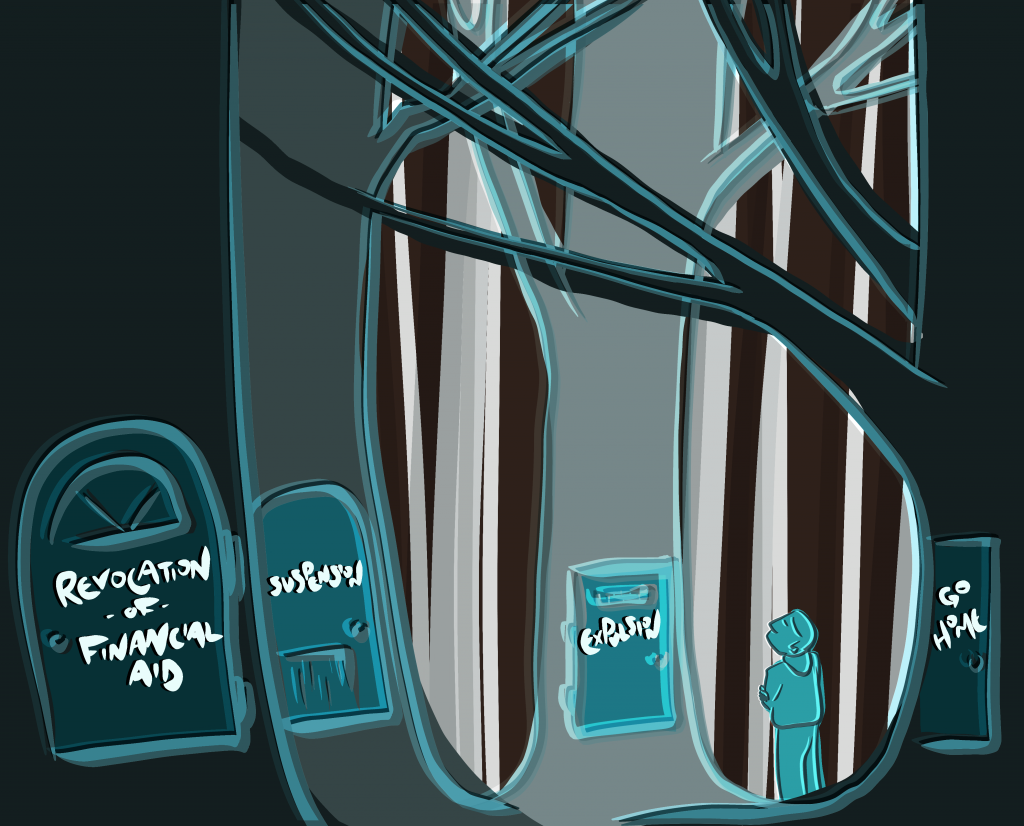On Wednesday at 10:15 a.m., Binghamton University President Harvey Stenger sent out a B-Line News Addition stating that as of Thursday, Oct. 8, all classes will move to an online format for two weeks, due to a spike in coronavirus cases. At the time of publication, BU has a total of 97 cases, with Broome county reaching just over 2,000 total cases since March. The campus itself will remain open during the temporary shutdown, with services like dining and transportation remaining in operation under restrictions.
This announcement comes just over a week after SUNY Chancellor James Malatras announced strict new sanctions for students and student organizations. The sanctions list several new punishments for those breaking social distancing rules and other quarantine guidelines, including suspension and expulsion for students found guilty of hosting or attending large social events and failing to comply with contact tracing. These sanctions will be especially pertinent during the shutdown period.
There was no announcement in the statement regarding how both BU and United Health Services (UHS) will handle testing throughout the two-week period. Surveillance testing must continue, even through the shutdown, to provide students with accurate data on the cases emerging where they live. If anything, testing should increase in order to accurately understand just how grave BU’s situation is. Surveillance testing only counts for a a portion of the tests and self-reporting has proven to be an unreliable method to diagnosing cases, especially when many may be afraid of the harsh repercussions proposed by Malatras. Enforcing these guidelines will undoubtedly require increased monitoring of students on the part of the administration, breeding a culture of fear rather than community and care.
With dining halls remaining takeout only and temperatures dropping, students are going to be congregating inside, where social distancing is less possible and less safe. This will put more unnecessary pressure on already overwhelmed resident assistants (RAs), who are already having to curb parties and social gatherings on campus. Those living off campus face the harsh SUNY guidelines should they be found in violation of any rule. There is also no word as to how testing will proceed for University employees.
Of course, upon hearing the news of a shutdown, the first things on many students’ minds will be just how long this will last. When the two weeks are up, how realistic is the chance that we will be able to open back up? The University needs to be open and honest with those odds.
The two-week shutdown also poses another opportunity for students — the opportunity to go home to their families. BU students hail from all over New York state, some areas of which are current COVID-19 clusters, and those who choose to go home risk either spreading or catching the virus by doing so. This not only puts the BU and Broome County community at risk, but the rest of New York state as well.
There was no mention of the possibility of students being sent home for the remainder of the semester. The administration must not pretend that our situation cannot get worse. We must not have a repeat of the spring 2020 semester, where students returned from a break only to be sent home not long after in a panic. The same thing could happen now, where students may feel it is safer to finish classes from their homes.
Yesterday, New York State Gov. Andrew Cuomo made specific restrictions for the city of Binghamton as a result of the increase in cases as well. Indoor and outdoor dining is still permitted, with reduced capacity, as is religious worship. Schools must also implement weekly testing.
This shutdown does not bode well for the proposed spring 2021 semester, which is still waiting for SUNY approval. A shutdown in October, with little promise of refunds for students, could leave many to reconsider if they will even come back in February, especially if they would’ve faced housing issues due to the new schedule.
Students deserve more than repeated warnings to “be careful,” and they deserve more than admonishment from an administration whose inaction was met with harsh SUNY sanctions. BU has yet to be fully transparent with its students and the options before them. Many statements coming from the University don’t take into account the true gravity of students’ situations. No one expects BU to have all the answers, but the money we pour into college and lose as a result of the pandemic has the potential to set us back years, and the health risks we face from this deadly virus are not ones we can take lightly. BU must be honest with students — we’ve already lost enough.



